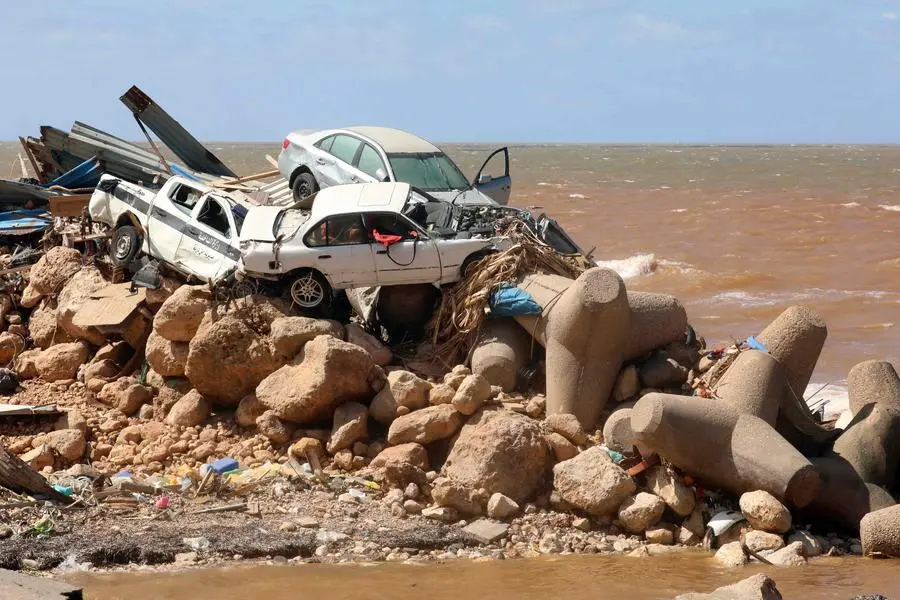PHOTO
A quarter of Greece's annual agricultural production was wiped out in last week's deadly flash floods triggered by Storm Daniel, which drenched the central region of Thessaly, according to experts.
The floods, which killed 15 people, have also left thousands of people in temporary shelters in hotels, schools or with relatives while 30 villages were inaccessible amid the threat of waterborne diseases.
Officials were trying to determine if a body found on a beach in Pelion, central Greece, was that of an Austrian missing with his wife since last week.
As government officials began the daunting task of mapping the damage dealt to the plain that feeds much of Greece, one pressing need was to dispose of tens of thousands of decomposing farm animals.
Out of over 110,000 dead sheep, goats, pigs, cows and chickens reported lost by farmers, fewer than half have been buried or incinerated, officials said.
Inspection crews were still unable to reach half the areas with reported dead livestock, the agriculture ministry said Wednesday.
"The damage is difficult to fully assess at the moment, but according to the most optimistic scenario, 70 percent of the cotton crop and almost all of the clover has been damaged," said farmer Athanasios Karaiskos, president of the farm cooperative of the town of Farsala.
- Health hazard -
The region's apple and kiwi productions have also been hit, while warehouses storing large quantities of wheat were flooded.
Some parts of Thessaly received "an astonishing 910 millimetres (three feet) of rain" more than a year's rainfall in normal conditions, said Katerina Kasimati, an agriculture engineer at the Agricultural University of Athens.
"These floods caused nearly 25 percent of the year's crop production to be lost, amounting to losses in the hundreds of millions of euros," she told AFP.
Commonly called 'the Plain' in Greece, Thessaly accounts for nearly a third of the country's arable land and over 18 percent of its crops.
"Farmers and particularly livestock breeders are in a state of panic," said Christos Yannadakis, vice-president of the union of Greek farm cooperatives.
In addition to knocking out power and flooding roads and infrastructure, the floodwater carries pesticides and waste from both farms and urban areas.
The health ministry has reported dozens of cases of gastroenteritis, warning residents in several areas that tap water was still not suitable for drinking or showering.
The fire department has rescued over 4,500 people from flooded areas. Seven villages are still stranded, the government said this week.
- Transport links hit -
The heavy rains and flooding followed devastating fires in Greece this summer that killed at least 26 people, most of them migrants trapped in a forest near the northeastern border with Turkey.
In Strasbourg this week to discuss the issue with EU chief Ursula von der Leyen, Prime Minister Kyriakos Mitsotakis said Greece faced a "catastrophe of immense proportions".
It was, he said, "beyond" the government's "scale of prediction and comprehension".
The EU said Greece could access 2.25 billion euros in pending and additional funds for reconstruction.
A part of the Athens-Thessaloniki national highway in central Greece is under water.
Serious damage to the rail network will take months to repair, Panayiotis Terezakis, managing director of the Hellenic Railways Organisation, told Star TV.
"The initial tally for all the damage dealt to the Thessaly rail network is 150-160 million euros," he said.
Rail services from Athens to Thessaloniki in the north will likely be restored in a month, Terezakis said.
For the national highway, Deputy Infrastructure Minister Nikos Tachiaos on Wednesday admitted: "There is nothing we can do. We cannot drain the waters and dump them on the plain because the water is coming from the plain...we have to wait for the natural flow," he told state TV ERT.
- Government under fire -
Mitsotakis' government, which comfortably won re-election in June, has come under fire for failing to adequately prepare after major flooding caused by a hurricane-like storm dubbed Ianos in 2020.
"Millions of euros were spent on flood prevention after Ianos and three years later, Thessaly is again plunged in water and mud," the main opposition Syriza party said.
The liberal Kathimerini daily over the weekend said the prime minister had put "lightweights" in key cabinet posts and urged him to "get serious".
Mitsotakis is rumoured to be planning a cabinet reshuffle, having already replaced two ministers since his re-election.
A judicial investigation has been opened into possible failings by public officials in dealing with the storm.





















